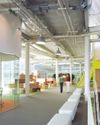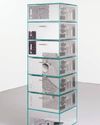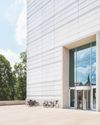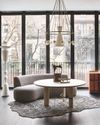Architects at the leading edge of sustainable building practices weigh the pros and cons of pursuing an array of ever-evolving “green” certifications.

The rear facade of Alan and Becky Solomon’s recently retrofitted Brooklyn row house is a neighborhood conversation piece. Those mod tropical-hardwood slats back there? Now repurposed, they used to be part of the Coney Island Boardwalk. The couple, meanwhile, marvel at subtler upgrades to their 120-year-old home: For one thing, there’s no “house smell” now, only breaths of outside-fresh air in every room. And each time they shut their triple-pane-glass front door, the city’s incessant jackhammers and sirens just vanish. “It’s so quiet,” Becky says.
Those sensory pleasures—a sealed envelope, the constant air circulation— are telltale signs of a passive house– certified project. Though it’s rare for architects to attempt to meet passive house’s stringent energy-efficiency requirements on a retrofit, Paul Castrucci was willing to work with the Solomons. In fact, the Manhattan-based architect markets his firm on those very skills; nearly a third of his commissions end up passive house–approved.
Yet you won’t hear him pressing his clients to pursue LEED certification. “LEED is unnecessarily difficult,” Castrucci says. “It would have cost $40,000 for paperwork on this project. That’s your solar system!”
Bu hikaye Metropolis Magazine dergisinin November/December 2018 sayısından alınmıştır.
Start your 7-day Magzter GOLD free trial to access thousands of curated premium stories, and 9,000+ magazines and newspapers.
Already a subscriber ? Giriş Yap
Bu hikaye Metropolis Magazine dergisinin November/December 2018 sayısından alınmıştır.
Start your 7-day Magzter GOLD free trial to access thousands of curated premium stories, and 9,000+ magazines and newspapers.
Already a subscriber? Giriş Yap

No New Buildings
The energy already embodied in the built environment is a precious unnatural resource. It’s time to start treating it like one.

The Circular Office
Major manufacturers are exploring every avenue to close the loop on workplace furniture.

Signs of Life
Designers, curators, and entrepreneurs are scrambling to make sense of motherhood in a culture that’s often hostile to it.

Interspecies Ethic
In probing the relationship between humans and nature, two major exhibitions question the very foundations of design practice.

Building on Brand
The Bauhaus turned 100 this year, and a crop of museum buildings sprang up for the celebration.

Building for Tomorrow, Today
Radical change in the building industry is desperately needed. And it cannot happen without the building trades.

Strength from Within
Maggie’s Centres, the service-focused cancer support network, eschews clinical design to arm patients in their fight for life.

Next-Level Living
The availability of attractive, hospitality-grade products on the market means everyday consumers can live the high life at home.

Mi Casa, Su Casa
Casa Perfect creates a memorable shopping experience in lavish private homes.

Enter The Culinarium
AvroKO imagines the future of residential amenities—where convenience, comfort, and sustainability meet.